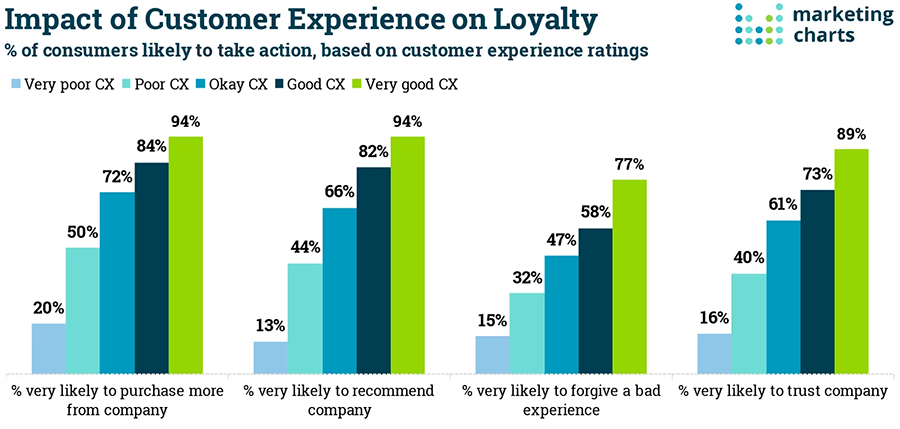7 Essential Skills and Traits to Be
an Effective Customer Service Agent
See also: Customer Service Skills
If the customer is king (or queen), then customer service must clearly be important. Customer service is the crucial ingredient that determines how successful your business will be. You may make the best bagels in the business, but if people don’t like the way your sales team interact with them, your bakery is going to be overflowing with unsold bagels at the end of the day.
Thankfully, there are some very clear tactics you can adopt to give your customer service team the shine they need to get those products moving. Let’s begin by looking at how enormously important customer service is from the perspective of the most important person: the customer.
Customer service and life and death (of your business)
So, it’s important. You get it. But did you know just how important? When a customer has first contact with your business, the customer service they experience is just as important as first impressions in individual relationships. In fact, it may possibly be even more important because the customer has every right to expect professional and considerate service.
You may be thinking, “Hey, it’s fine!”. I never get any complaints about my customer service, so everything must be cool.” I’m afraid not. 95% of unhappy customers never complain. Most worryingly, 91% of them just go elsewhere for their products. So, you need to be proactive and sharpen your tools before you finally hear that your customer service isn’t cutting it.
Improving customer experience should be a priority for three main reasons. First, it creates a positive impression when the customer first encounters your business. With all the competition out there, everyone needs to be bringing their A-game every day. If you’re fielding a team of duds, you can be sure that your customers will look elsewhere. After all, the league’s just bulging with champion-level outfits waiting to run away with the fixture.
Second, you will stand a higher chance of getting some good up-selling and cross-selling action if you’re giving the customer a great experience. People are more likely to go for a higher spend if they feel looked after and generally happy with life. This will impact nicely on the AOV marketing results of your business.
Finally, you’ll reap the long-term benefits of enhanced loyalty.

To retain good customers is the motherlode: it’s so much more efficient to keep customers rather than have to look for new ones. And the great thing is that your existing customers will wax so positively about your business that you’ll get new customers trotting in too. Being able to get organic growth like this is something to be highly valued.
Here’s one final thing to think about before we go into how you can improve your team. Not only is customer service important, but it’s also becoming more important all the time. 54% of consumers expect higher standards of customer service than they did one year ago. You’d better get with it. Here are seven ways how:
Get positive

There’s no getting away from it. Behavior breeds behavior. The more buoyant your staff are, the more the CX is boosted. This doesn’t mean insane amounts of relentlessly chuckling cheer. That’s just odd. But being able to deal with issues in a positive manner is priceless, especially if it revolves around a complaint.
When a customer reaches out for assistance because they have a concern, the way that the staff member deals with the interaction can make the situation much worse very quickly, or, with an eye on turning the encounter into an opportunity, it can be made much, much better.
For instance, a customer complaining about a product being received through the mail in an unfit condition will be impressed by a polite hearing and speedy resolution of the problem, whether it be sending out a replacement product or a compensatory solution. So, in the right hands, an unpromising start can be transformed into a panacea of positivity, which the customer will appreciate and will likely lead to them sticking around for future purchases.
Positivity should pervade all service agent language. If a customer wishes to purchase something that’s out of stock, avoid a cursory “Sorry, not available at the moment.” Instead, try “They’ve been flying out lately - such a good product. I can tell you that we will have more in in two weeks. Would you like me to set one aside for you? No problem at all.” The direction of the encounter is altered, and the interaction’s storyboard is transformed for the better.
Know your products
A customer will often assume that no matter how vast the business and broad the product range, all service agents will be au fait with all the items for sale. Perhaps it’s unreasonable to assume that a service agent will have this kind of knowledge when it comes to a truly massive operation.
But customers aren’t there to be reasonable. They’re there to give you money if your service satisfies their expectations. Making sure that the service does this should form a fundamental part of the large and small business management definition.
So, training is hugely vital. Regular sessions with the staff running through the winning features of new products, and refreshers on the products that you’ve had for a while, will pay dividends. You can do this face-to-face. However, many managers find that they simply don’t have the time for this and that most of their time is spent on admin.

For this reason, video training is becoming more popular as an efficient means of improving performance.
You can, of course, augment the operation by providing staff with great information on each product available via your product management system. Make sure it’s well worded and the kind of material that a staff member who is frankly in a bit of a bind will be able to read off without giving their lack of knowledge away.
Now, let’s go back to those substandard teams we mentioned earlier. Sometimes, a tech solution will work wonders. Next time you need to transform duds into dudes, try a DID. What is a DID? It’s a means of giving virtual numbers to all your staff, which can result in greater connectivity to the system as a whole.
Do bear in mind, though, that this should be regarded as an assistance technique. Nothing truly replaces product knowledge, so ensure your staff have it. This leads us to our next point.
Self-starter
An eagerness to do the job to the best of their ability is what sets apart the great customer service agent from the rest. This kind of person will ensure that they are in tip-top form for every shift and will take it upon themselves to keep their knowledge of new products and fresh priorities up to date.
However, for some, there may be a particular aspect of the job that’s sapping their eagerness to perform. Perhaps there’s an issue with where they are sitting in the office. Perhaps they might be better working a different shift. Perhaps they’re having difficulty with the BYOD device policy. Perhaps you can figure out a way to help them.
For this reason, it’s always important to sit your despondent staff member down and see if there are matters that might need to be addressed. If you can transform part of your team from a negative to an asset just by moving them away from an over-active radiator, then that’s a great result.
Patience and a thick skin
Anyone who has worked in customer service will know that it can be really tough. Customers who are pleased with their experience and just want to buy something are generally a delight to deal with, especially if sales and support are both giving the same sublime service.
Those with an issue can be angry, demanding, aggressive, and rude. Sometimes, this will be dissipated by great service, but other times, that won’t be the case. Sometimes, customers are just looking for a space to vent. They may feel so aggrieved that they’re looking to score one back, and rudeness can be very satisfying if you’re that way inclined.
Some people can cope with this onslaught better than others. But even if you have a member of staff who isn’t a natural at coping with this, they can be trained to deal with this kind of situation. By giving them a toolkit of ways to deal with these issues, you can help them in no small way. Consider making a video of the optimal ways to respond to given situations. It can embed best practices if the employee has a chance to see them in action.
However, the most important factor that the team member can possess is patience. This will enable them to stay calm and not escalate unfortunate aspects of the interaction. And a thick skin will ensure that they don’t take the unhappy customer home with them (not literally).
Problem-solving mentality
Most of all, customers want their problem to be solved. So, the service agent has to be in problem-solving mode, even if the issue seems like a big insoluble mess. This can be especially the case if the problem has been going on for some time and the service agent is inheriting an unhappy situation after a long line of unsatisfactory encounters with other staff members.
A customer service agent who is able to “chop” the problem into smaller discrete issues will be able to deal with things more effectively. And as each problem is surmounted, the customer’s buy-in is more assured. In this way, an apparently intractable muddle can be dealt with in clear and chewable nuggets. By changing the level of focus, the service agent can identify a string of easier-to-deliver solutions.
Personality pays
No matter what customer service solutions you employ, some people just have the personality to sway situations. A lot of it boils down to being willing to downplay their own significance in the interaction. In other words, they’re aware that they’re not in a battle to assert themselves. They are there to administer a service.
It may be that this will require them to be a little more pliable than they would be outside the role of the job. It may require them to apologize when it clearly was in no way their fault. But they are there to represent the company, and if the customer perceives the company to be at fault, then there has to be an expression of that culpability from somebody. And that somebody is the service agent.
The service agent also needs to be able to exhibit empathy. If they can do this and forge a connection based on a clear understanding of the plight the customer is going through, this will propel everyone towards a mutually satisfactory solution more quickly than if the customer feels that the agent is just not “getting it.”
Some people will have a personality type that predisposes them towards these qualities and behaviors. Those that don’t can be trained. A great deal can be done to give service agents a different perspective on customer relations that can help them to reframe their input.
Quirks work
In a world that can be too full of uniform drabness, an individual being a little out of the ordinary can really make an impression. An agent who’s able to marry high levels of professionalism with an element of idiosyncrasy or a quirky kind of resourcefulness will enable your business to stand out from the faceless crowd.
This is why it’s always a great idea to employ characters if you can. They can even be used beyond the normal customer service agent role. Perhaps consider using them in product videos, should you wish to go down the visual merchandising online route.
They have to be the right kind of character, and this is where your judgement is of supreme importance. And they have to be able to give the same emphasis to customer satisfaction that you would expect from any other agent. But if they can do so with a human face, that will assist in the fight against sameyness that all right-thinking people should be engaged in.
Further Reading from Skills You Need
Our Communication Skills eBooks
Learn more about the key communication skills you need to be a more effective communicator.
Our eBooks are ideal for anyone who wants to learn about or develop their interpersonal skills and are full of easy-to-follow, practical information.
Conclusion

Customer service has become the number one priority for many businesses. You should make it yours too.
You can start by appreciating that the job of a customer service agent is fundamentally one of assistance. This assistance can take many different forms, from sales to specific issue remedies, to just being a sympathetic ear while a customer gives lengthy exposure to their warranted or unwarranted concerns.
While it certainly helps if a staff member is the kind of person who gives assistance readily and naturally, the pro-active employer can do a good deal to boost performance in most personality types. Training and regular check-ins can work wonders with the most unlikely specimens. The customer will then go away happy, which means the agent can be happy as well as you.
About the Author

Grace Lau is the Director of Growth Content at Dialpad, an AI-powered cloud communication platform for better and easier team collaboration. She has over 10 years of experience in content writing and strategy. Currently, she is responsible for leading branded and editorial content strategies, partnering with SEO, and Ops teams to build and nurture content. She’s written for websites like Castos and Scoop.it.

